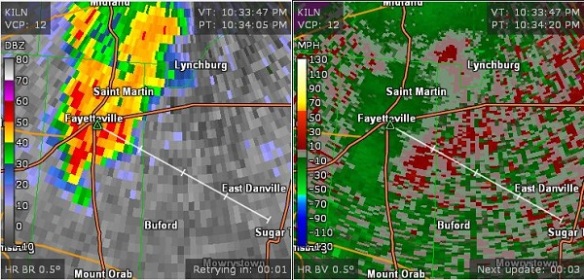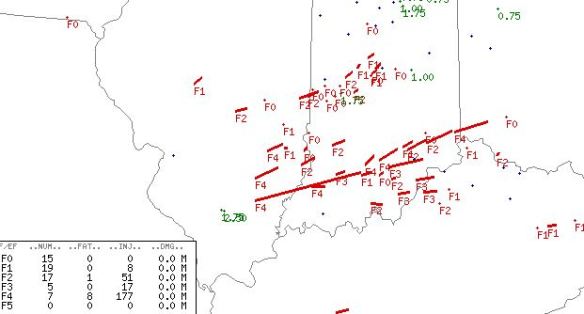I’ve often reflected on my days working as a full-time meteorologist, and I wish I had learned some key lessons much earlier in my career. Alternatively, I wish there been someone to be honest and tell me these lessons of life years ago. Being a meteorologist is a challenge, a gift, a pain, and a reward. It’s easy to get lost in your career and model data, but after 10 years working as a meteorologist and 1.5 years working in the business world (and also time to reflect of my previous career), I wanted to share 18 ways to be the best meteorologist you can be:
1. Realize what your job really is. Suppose you’re an NBA player. What is your job? Is it to score the most points? Is it to be the game MVP? Is it to get the least number of fouls? It’s none of these. It’s actually to get the most number of people in the stands and watching you on TV as possible. It sounds selfish, but without tickets being sold and audiences watching you, you’re likely to be out of a job because your team needs to make money. Now suppose you as a businessperson at a local firm. What is your job? Is it to make the most numbers of sales in your peer group? Is it to give your customers a new product or service every month? Is it to build your resume? Just like the NBA, it’s none of the above…and it’s really to maximize the company’s profits and brand ethically, sustainably, and responsibly. Now you’re a meteorologist. What is your job? It is likely to increase your company’s profits. If you’re a operational meteorologist in the private sector, it’s to get people paying for your forecasts or seeing advertisements where they are posted. If you’re an National Weather Service meteorologist, you’re in a unique position: your job to to issue forecasts, outlooks, advisories, warnings, and watches that protect life and property…or create tools that fulfill this mission. If you’re a broadcast meteorologist, your job is to sustain or boost ratings through marketing and accurate forecasts (perceived or reality). You don’t have to have the best forecast to make the most money; you just have to have superior perception or superior value to customers.

2. Start looking at those you forecast for as customers. Speaking of customers: those who see your products and forecasts are not “viewers” or “the public.” They are customers. If you think back to your summer jobs in high school and college, you served customers with a smile and by giving those who came into your business a product or service with value. People who read your forecasts or hear your weather presentation should be treated with respect and dignity; there’s no inferior customer, and you should work to give them what you want within reason.
3. Data and insights are the best way to be different. So you have a good forecast, and you need to make the company money through your customers. What’s the best way to attract them to you? Your bright and cherry personality? Your good looks? Your wonderful smile? Your baritone pipes? Talking like you’re on old time radio? Try a more humble approach: data and perspective. You have storms moving through; they are threatening and strong. What do your customers want? They want to know where the storms are, where they are moving, and what impact they will have. Your shiny personality won’t save you; you need to know how to use radar (reflectivity, velocity, spectrum width, and all of the dual-pol products) and know the threats before the National Weather Service does. They want to know where power outages are. They want to know whether this is normal; that’s where your experience comes into play. They want to have minute-by-minute updates of what conditions are like; knowing where to find airport and local weather sensor data will enable you to tell your customers with confidence what is and isn’t happening. Knowing where to find field and model data that no one else can will give you an advantage over your competitors but will also inform your customers. Telling your customers is one thing; showing your customers is another. Are you getting that data that tells your weather story into your forecasting or weather presentation system? You should be. If you’re not, figure out how to make it happen! Learn and innovate!
4. Aggregate and organize data behind the scenes. This will save you a lot of time and enable you to focus more on what’s important. Programming will help you assemble model guidance and quality control it so you don’t have to waste time each day when you’re forecasting. Surprise! There’s an earthquake! Are you ready? How are you going to be a source of information to your customers? If they get valuable insight and information from someone else, you risk losing your reputation and credibility…and, more importantly, perhaps your job and company’s profitability.
5. Ask your customers want they want, and give them some of what they don’t. Let’s go back to that NBA game where you’re a point guard. What do your customers want? They want to be entertained! They want you to win the game, especially by a game-winning-buzzer-beating shot! But let’s say you’re not a big 3-point player; on occasion, take a 3-point shot. Your fans won’t be expecting it or even want you to take the long shot, but they will be happy if you make it. As a meteorologist, that means things like explaining vorticity at a very basic level and why it matters. It also means varying your style; take a dare to be different at least occasionally, even if your customers like a pattern.
6. Forecast specifically, and lead with what you know. Your customers can get a wishy-washy forecast for “a chance of storms today” from anywhere. Lemme guess; you have the word “details” in the tease to your forecast? Your customers have seen that. Give your customers an accurate forecast. Say “scattered showers and thunderstorms between 1pm and 7pm” with confidence. Some days, you’ll have models that are out to lunch. Tell the people what you know. When is the most likely time for rain? Can you say with confidence that the rain will be light? How would you describe the coverage, even if you’re a little off? What will happen, and what is to be determined? Don’t focus on potential or what won’t happen; focus on what is certain.
7. Don’t be a National Weather Service repeater. Be a meteorologist. If your prime responsibility is to just relay what the NWS says, you’re not using your degree in meteorology, and they are. You don’t need to tell your customers about every alert the NWS issues, including non-life-threatening alerts like Flood Advisories. If you feel that the National Weather Service is slow to the punch on an alert (or warning), tell your customers; you don’t need to wait for their blessing. They aren’t waiting for you, and you have the same degree (at least you should), so get movin’!

8. The best starting forecast is the last shift’s forecast. It’s a lot easier to use the previous shift’s forecast as a starting point. Ask yourself: do I have justification to raise high temperatures 1° every day for the next 5 days. Think of your customers: do they care? Is it better to be consistent or forecast every shift not even considering the slew of model data the previous shift reviewed? Humble yourself, and recognize that there is value in your predecessors’ work. It’s also a lot less work to use the previous forecast as a starting point.
9. Don’t be so eager. If you’re willing to work turn-around shifts or go to work on a few hours of sleep, you’re likely too green. Don’t be a sucker. Say “no” at least occasionally. Do your job, and go home. Don’t get walked all over. If you’re working all of the holidays, weekend, and non-prime-time shifts, you’re getting the shaft. Over time, you should be advancing. You’ll look like on your “green years” and shake your head if you’re not careful.
10. Perspective requires research. When you’re going into a severe weather event, do you know the last time a tornado was confirmed in your area of responsibility? Do you know how rare an EF-2 or EF-4 tornado is for your area? When an insurance firm says that the damage caused by storms in your areas responsibility is estimated at $1 billion, does that seem right? If you’re expecting a high of 100°, are you prepared to answer questions from your customers about how often your area of responsibility sees a high of 100°? Regardless of what you do as a meteorologist, you need to provide perspective on weather events. Being a smiling face and personally won’t cover for you when you have to explain weather to your customers.

11. Force yourself to get away from work. You can’t work all of the time. Time out some of your social media posts. Get a good significant other. Make friends. You need distractions from work or you’re going to burn yourself out. If you must post on social media during your days off, however, use your office tools to post data to a website where only you (or others, if you want) can grab it and post it; this is a good way to post your brand while not at work. Your job should only be a part of your life.
12. Be ready to move at any time. Whether you’re a National Weather Service meteorologist, a private sector meteorologist, or a broadcast meteorologist, it is highly likely you’re going to have to move during your time as a meteorologist. You’ll likely need to do it to advance. Suppose you’re in broadcasting, and you want to be a chief meteorologist. Do you think you’re going to get the job from your current chief when he or she leaves? That’s probably not going to happen. It does happen, but it’s not likely. It’s far more likely that you’re going to have to move to Omaha, Boise, San Antonio, or Huntsville to get your chief gig. And then you have to love that town and city and connect with it. Are you willing to do that? Now suppose you’re an NWS meteorologist and want to be a lead forecaster. Are you willing to move to North Platte, Nebraska to do that? You may have to. There aren’t a lot of meteorologist jobs in any given town, so if you want to advance in the industry, you’ll need to pack yourself or your family up and move at least once…and likely a few times before you’re in a semi-permanent spot. Going back to the earlier example, even the best NBA players got traded or went to a new team after a while.

13. Corporate consolidation is not your friend. The modern way of doing big business – so it seems – is to buyout a company and collect their revenue while paying down the debt. Every good business, realistically, needs to monitor their cash flow (both revenues and costs) and increase profitability. One way to do this is to scale. If you stay with your company long enough, they will likely be bought. Even The Weather Channel got bought by IBM. The National Weather Service is likely exempt from this clause, but the broadcast and private sector will see this for years to come. When you get acquired, the rules change. Managers get fired and replaced with new ones. The expectations and demands of jobs are different. The culture changes, and – unfortunately – the ethics of your employer can change. If you don’t like your new company, there are a decreasing number of employers for which you can work (they are consolidating). If you leave Company A and go to Company B, there’s a chance Company A will buy Company B, and your soliloquy about “poor working conditions here at Company A” will come back to bite you. Leave on good terms as much as possible because the grass isn’t always greener and everyone is buying up land.
14. Ask yourself two questions frequently: “Do I enjoy doing this?” and “If not, how much longer am I going to do this?” When you first start in meteorology, you’re going to be bottom man or woman on the totem pole. You should be, but – in time – you should also advance. Unfortunately, some people don’t advance, and some – even worse – get demoted over time despite good performance. Meteorology and communication are inherently linked, and – despite what you may or may not know – companies often know who they want to communicate more than who they believe is the best meteorologist. With everyone marketing themselves as giving the “more accurate” forecast, companies need to position themselves to have an advantage. They will do that in any way possible. Your responsibilities may not be purely meteorology. Your schedule may be affected by what a company wants to do with you. You may be paired up with people that you like or don’t like. Your team may be great, or your team may not be great. Too few meteorologists regularly review their current situations and ask themselves if they are happy and successful. If you aren’t happy, set a time limit for how long you’re going to do what you’re doing. You’ll need to pay your dues early in the game, but you’ll also need to move on if you’re getting a raw deal.
15. Be careful what intellectual property you create for your company. If you’re not happy where you are, be mindful of what you’re building for your company. Do what is asked of you…but if you’re on your way out, don’t go sharing every idea you have or implementing new competitive advantage tools to make the company better. That idea you’re sharing or implementing may be the company’s once it leaves your lips. Instead, share your brainy ideas in a place and with a company that appreciates you and what you’re developing.
16. You aren’t ready for office politics, but you can and should learn them quickly. There is no high school or college course – that I know of – that prepares you for office politics. Careers in meteorology – like all forms of business – have politics. Companies put people where they want. Companies have their top picks and their bottom picks. You’ll have your days where you feel valued, and there will be other days when you feel very unimportant. Office politics is a complex game that you should not be a master at. Instead, I suggest distancing yourself from problematic people, not insulting others, and laying low. If you’re frustrated, don’t make a scene, and be respectful when solving problems. It is often better to be quieter and watch (and learn from) others who harm themselves and their career for fighting the law (and watching the law win).
17. There will always be someone younger than you who wants your job, and they will do it for less than you. It’s the truth. If you get greedy, companies will find someone else who will take less of a salary and fill your seat. Follow the trends of companies who hire meteorologists. Who are they moving and why? Who are they hiring and why? The trends will help you know whether you should stay or get out of the way.
18. The hardest thing to predict is human behavior. You will, however, be much better prepared if you look for clues and red flags constantly. Circling back around to the NBA player example above, being a basketball player is more than scoring points. You are part of a business, and if you aren’t giving what the business wants, your days are numbered. Understanding what the business wants you to do and mastering that goal is your number one job objective. Business needs, however, change…so you must be willing to listen, learn, and innovate. You must anticipate and monitor your company’s business goals and opportunities and prepare for them. If you’re the leagues best scorer, but the fans and business want close games to drive ratings and create a certain experience, you better strategize how and when you put points on the board. As a meteorologist, this means understanding your business, what they define as value, positioning yourself to fulfill the company’s goals.
Remember that most meteorologists that start their working life in meteorology usually end their working life in another field. It’s okay to evaluate your happiness and success frequently, and it’s okay to make a change. As long as you’re in meteorology, strive to stand out and be different in a positive way. Do they have “one of you?” If so, there’s a better fit for you elsewhere…or you should showcase a different talent. Michael Jordan wasn’t an actor, and he wasn’t in movies and getting endorsements because he was made for the big screen; he got the right kind of attention and he gave his customers want they wanted.
